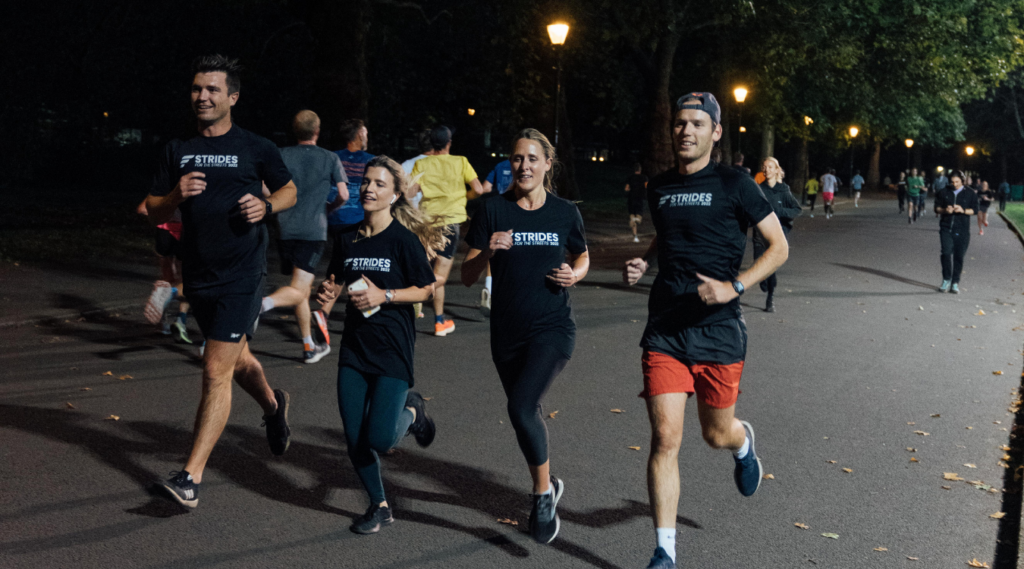5 Key Considerations For Fuelling 5KM

We’re back for our 4th year bringing the community together to give back. A quick sweat, a lot of fun and an incredible cause.
As a team, we’ll be taking to Battersea Park for our annual Strides for the Streets 5km event. We are raising money for The Soup Kitchen London, a charity we have worked closely with for a number of years.
The Soup Kitchen London is a life-changing enterprise. They provide healthy and nutritious food, unprecedented mental health support, clothing, and friendship for the homeless, elderly, lonely and vulnerable throughout London.
If you’re taking on our 5km or just keen to get started with running, here are our 5 key considerations for fuelling 5km! 5 for 5…see what we did there!
1. Ensure your intake supports your training
Firstly, ensure your overall calorie intake supports the extent of the training you are doing. If this is insufficient, your training and recovery will likely start to suffer. This is definitely not what you want if you’re trying to be consistent with your exercise routine. Not fuelling your body appropriately will quickly catch up with you. It can take the form of adverse effects such as low energy levels and increased frequency of injury or illness.
If you are unsure as to how much you should be consuming, we’re on hand to take out the guesswork for you!
2. Carbohydrates are important but don’t overcomplicate it
Carbohydrates are essential, so do not shy away from them! They are your body’s primary source of energy during this type of exercise. Therefore, it is important to give your intake some consideration. However, you don’t need to overcomplicate it when it comes to your nutrition strategy for running a 5km.
On the day before, there is no need to carb load as this is a strategy usually used for events of 90 minutes or longer. You’ll be done with your 5K long before that! For a 5K, it’s likely that you have enough fuel in your muscles from your pre-race meal to perform your best without risking running out of energy.
On the day of, aim to eat a balanced meal or snack 1 to 3 hours before your run – the bigger the meal, the longer you’ll need to leave before setting off. This allows your body enough time to digest and absorb the nutrients. It also minimises the risk of discomfort or digestive issues during your run.
If you’re getting up early to get out for your run, leaving up to 3 hours before heading out isn’t very practical. Aim to have something light on your stomach and carb-rich, for example, a banana or a slice of toast with jam.
If I have the time, my usual go-to for breakfast is overnight oats/porridge or a bagel with peanut butter and a banana.
3. Stick to what you know
Avoid having a high-fibre, protein or fat meal/snack before your run. It will slow down digestion and can cause you some gastrointestinal discomfort. This is the last thing you want during your run!
When it comes to a run, try to stick to foods that you are familiar with and have successfully consumed before. Avoid experimenting with new foods or supplements too close to an important session. This will help to prevent any potential digestive issues or discomfort.
4. Intra-run nutrition isn’t necessary
In general, for a 5km run, it isn’t necessary to eat during the run itself. It can typically last anywhere from 15 to 35 minutes for most individuals. Given the relatively short duration, your body doesn’t deplete glycogen stores (stored form of carbohydrates in muscles and the liver) to the extent that requires immediate refuelling. Your existing stores should provide enough energy to fuel your exercise. With proper pre-race nutrition, your glycogen stores should be adequately stocked.
5. Hydrate wisely
Ensure you are adequately hydrated to support optimal performance. Aim for 2-3 litres of water each day and ensure you rehydrate after your run. This is especially important if it is warm and/or your sweat rates are high. Consider water, as well as sports drinks/hydration tablets, to replenish both water and electrolytes lost through sweat.
Also, try to limit caffeine and carbonated drinks beforehand, as they can cause GI discomfort.
If you’re keen to lace up your runners and join us in Battersea, get your ticket for Strides for the Streets here.
Find us at Battersea Park for a friendly 5K run, arriving at 6:00 p.m. with the run commencing at 6:30 p.m. Join us afterwards to refuel with delicious snacks and juices and mingle with the community.
Tickets are £10. This includes entry to the run, an event T-shirt and a goodie bag with some treats from our partners.
We look forward to seeing you there!
- The Comfort of Tradition: Why We Crave Holiday Foods - December 23, 2024
- Is There a Place for Ultra-Processed Foods in Your Diet? - November 29, 2024
- Tempeh and Quinoa Power Bowl Recipe - November 7, 2024